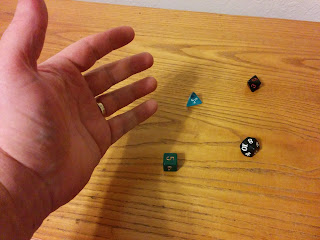A friend of mine recently posted a link to an article about playing D&D with your kids. It was short, but had some interesting points. In particular, there was the part in which the author described a gaming session with his group that includes some parents who'd brought their children to the game. In this particular session, the three-year-old daughter of one of his fellow players was having fun with his miniatures. He states,
...as I was explaining what each monster was she began to ignore me and make up her own names and stories for them all. I smiled and played along with her. As we played however, I noticed that this was really kick starting her imagination. Stories of strange beasts and dragons with giant spiders as pets...I don't have any children. My wife and I have chosen a different life path for ourselves. But I know several gamers who do have children. John Trobare, whom I interviewed recently, has a few, and he plays board games with them all the time. I don't know if he's ever tried to get them into roleplaying. But I have known other parents who have.






